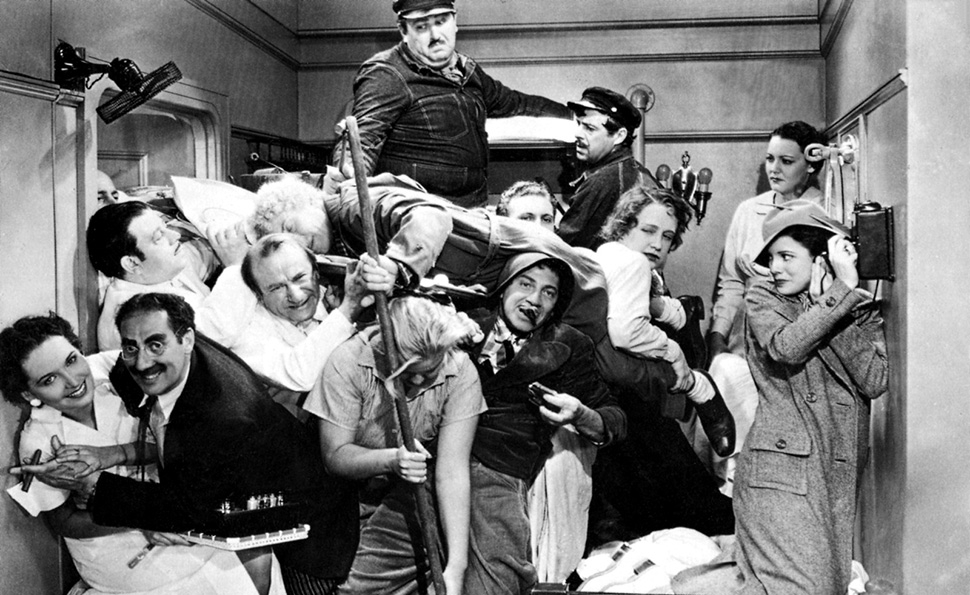
| USA, 1935 | Comedy/Musical | Mainstream | Trailer |
As far as I can remember, comedies were my first contacts with talkies, or immediately-post-silent-era classic movies. It’s an easy genre with eternal qualities, and experience tells me people are always more prone to appreciate a good laugh than any other thing when touching a filmic era that is different from today’s standards, concerning all possible fields.
The Marx Brothers are a legend when talking about comedies from the talkie era, or directly from all cinema history. The most well-known three of them (Groucho, Harpo and Chico) are also the protagonists of the movie I am commenting today, whilst the other two that also appeared in the filmic world (Zeppo and Gummo) kind of low-key abandoned the industry when the finest adventures of this peculiar family were crafted. A Night at The Opera is considered, not more and not less by Julius (Groucho) himself, one of the two best works of their filmography, belonging to the Sam Wood director era (the other would be A Day at the Races).
Essentially, A Night at the Opera flaunts everything that makes a Marx Brothers movie, and does it in the most refined way. Witty and acid one-liners for Groucho, crazed slapstick for Harpo and dialectic twists for Chico succeed each other with amazing easiness and, especially, rapidness. Director Sam Wood shows his magestry in orchestrating and putting order in the huge mess that is bound to let the comedic skills of the trio shine in this movie, which includes some of the most iconic scenes and gags of their whole career. Because, after rewatching A Night at the Opera after so many years and having gathered more filmic experience in the meantime, I can recognise that this movie only serves as a support ground for the Marxes and their antics. Every other thing -props, scenario, side characters- is totally secondary, and is destined only to show how the brothers can make humour about anything.
Aside, I could also recognize that this movie sets ground in another way. Before the Sam Wood era, the Marx Brothers movies were only a more-or-less fortunate succession of gags. A Night at the Opera is crafted in a way that imitates the entertainment genre where the Marxes debutted, vaudeville theater. This movie makes several pauses in the stream of humour to show amazing (for the time) musical and dancing numbers, and even ventures to show the skill of Chico and Harpo in playing instruments: a trend that would be repeated in all their posterior movies.
If I had to find anything that, after the rewatching experience, I disliked, it would surely be that its style is too 1930’s. The talkie era, whilst obviously includes many wonderful movies, has a certain artistic trend that feels so different and unnatural that I can never fully enjoy any movie from this time. The artistic direction of these works always features synthetic scenarios that are not destined to imitate reality, but to convey a certain theatrical and aesthetical richness, combined with too many general and first planes and barely no camera movement. This way of filming, whilst absolutely theatrical and with aesthetic value, feels odd and unnatural, but this is a personal impression. The end of WW2 would also mean the end of this trend, probably originated by the aesthetical and detail-rich spirit of art déco and the 1920’s zeitgeist.
Rewatching A Night at the Opera has made me remember the good humour of the Marx Brothers and why I liked it so much as a child and teen, but also has shown a shadow I was not able to see when I was more innocent in the filmic world. I risk myself to it when venturing a rewatch of a dear old work from the past, and it’s sad. But hey, I still had a good laugh with this movie, and this is ultimately what I still expected.